|
|
|
Sort Order |
|
|
|
Items / Page
|
|
|
|
|
|
|
| Srl | Item |
| 1 |
ID:
092397
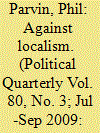

|
|
|
|
|
| Publication |
2009.
|
| Summary/Abstract |
The continued decline in levels of political engagement among British citizens has led many politicians, commentators and academics from across the political spectrum to advocate a move toward a more direct form of democracy via some kind of localism. The claim is that citizens feel increasingly estranged from the democratic process, and from those organisations on which they have historically relied to represent them within the political system. Consequently, localists argue, there now exists a gap between the people, the institutions which are supposed to work on their behalf, and the decisions made in their name, so the system needs to be reformed in such a way as to give individuals and local communities more of a direct input into the decision-making process. Calls for a more direct form of democracy via localism are popular among members of the progressive left and the 'new Conservative' right, and have become so dominant in political discourse that it is often suggested that 'we are all localists now'. This article raises questions about the localist agenda, and suggests that the adoption of a more direct form of democracy in Britain may not only fail to address the decline in political engagement, but may also result in the exclusion, marginalisation, and oppression of minority groups
|
|
|
|
|
|
|
|
|
|
|
|
|
|
|
|
| 2 |
ID:
146658


|
|
|
|
|
| Summary/Abstract |
This paper addresses the ambiguity of the term ‘sovereignty’ in food sovereignty (FS), intending to clarify the ‘aspirational sovereignty’ that food sovereignty movements indicate as the ideal configuration of power that would allow FS to flourish, or which might help measure movement towards FS. Since aspirational sovereignty is conditioned by existing power relations, the paper elaborates components of ‘actually existing sovereignty’, based on readings of a variety of political and social science literatures. By critically assessing the difference between actually existing and aspirational sovereignty across three geographic–political levels, the paper offers strategic options for constructing FS, and suggests what such an elaborated definition of FS’s sovereignty might offer future research on FS.
|
|
|
|
|
|
|
|
|
|
|
|
|
|
|
|
| 3 |
ID:
187730
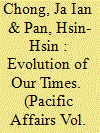

|
|
|
|
|
| Summary/Abstract |
Two trends have become increasingly apparent from public opinion polls in Taiwan and Hong Kong over the past decade. One is a growing identification with and confidence in being exclusively Taiwanese or Hong Konger. The other is increasing public support for democracy. Existing research investigates the association between local identity and democracy, but does not address the meanings people in Taiwan and Hong Kong ascribe to their identities. This limits a fuller understanding of the relationships and driving forces between and behind these trends. One interpretation is that demands for greater democracy mask growing nativism, even xenophobia. An alternative one is that heightened local identification reflects aspirations for greater political participation and restraint on executive authority in Taiwan and Hong Kong. Using discourse analysis collected through the Making Identities Count in Asia project, alongside polling data, we submit that elite and mass discourse reveal an integration of democratic expectations with local identity and its broadening appeal in Taiwan and Hong Kong. People in these two societies take principles associated with democracy to be closely tied to their sense of identification and locality. Such ideas do not eschew the value of tradition rooted in local experiences and can outweigh economic growth. However, Hong Kongers and Taiwanese have come to identify substantively more with democracy than the exceptionalism implied in “localism,” “Asian values,” or some form of nativism. PRC attempts to appeal to local concerns in Taiwan and Hong Kong need to grapple with either meaningful respect for democratic aspirations or effectively repressing them. PRC insistence on the erasure of such values will likely result in continued tensions with Taiwan and Hong Kong, and include mass resistance and the need for force, even violence.
|
|
|
|
|
|
|
|
|
|
|
|
|
|
|
|
| 4 |
ID:
162094
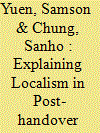

|
|
|
|
|
| Summary/Abstract |
The pro-democracy movement in post-handover Hong Kong had long been an intense struggle between the hybrid regime and prodemocracy civil society. Since the early 2010s, a new political force, broadly known as the localists, has entered the political domain through a series of protest events and elections. However, just as they gained a foothold in politics, the hybrid regime swiftly moved in to clamp down on the nascent movement to keep them out of the political system. What explains the ebbs and flows of Hong Kong’s localist movement? This essay posits that localism is not an inevitable product of the macro-structural socio-political process, but an amalgam of ideas and action logics assembled sequentially through events and discursive constructions. We argue that localism first emerged through the interplay between antimainlandisation protests and both online and intellectual discourse, and officially ascended to the political stage after the Umbrella Movement. Despite their meteoric rise, localists’ militant actions have allowed the hybrid regime to marginalise the nascent force through legal and non-legal repression, which has in turn created a “divided structure of contestation” among the opposition.
|
|
|
|
|
|
|
|
|
|
|
|
|
|
|
|
| 5 |
ID:
137723


|
|
|
|
|
| Summary/Abstract |
This paper is interested in sustainable energy initiatives in French rural areas. It follows up the UK debate about ‘localism’. UK policy localism has been cast as neoliberal, framing communities as competent and competitive actors, morally responsible and accountable for their destiny. In France, the emerging policy localism is surfing on an ongoing political structuration of innovative rural territories – ‘Positive Energie Territories’ (TEPOS). The paper presents and discusses the results of a rough census (undertaken in 2012) of significant experiences in this domain. It points to a few experiences and depicts them as risky, trial-and-error transcalar processes that endow locally emergent energy issues with a political dimension. To this extent, they amount to a different way of doing energy policy. The analysis points to an ambiguity in French policy localism. This localism may pave the way for an upscaling of the ongoing TEPOS political structuration, or tend to make TEPOS into demonstration territories within a neoliberal RTD policy approach. In the latter case, it may not necessarily fit territories to pursue their political structuration with a view to the energy transition.
|
|
|
|
|
|
|
|
|
|
|
|
|
|
|
|
| 6 |
ID:
147845
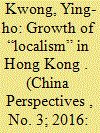

|
|
|
| 7 |
ID:
175066
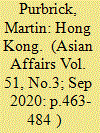

|
|
|
|
|
| Summary/Abstract |
This article explains why Hong Kong is a “torn city” with divisions in society resulting from the historical alignment of the city with the West, and the economic and political integration with Mainland China that reflects the vision of the governing and business elite of the city being part of the rise of China. The “torn city” reflects cultural divisions between the Western model of capitalism and governance and the communist system of the People's Republic of China. This cultural division and the resultant popular discontent have been exacerbated by poor governance in Hong Kong with a local government and the business elite that has resisted changes in governance to improve the welfare of those of the population who have not benefitted from economic growth in the city.
|
|
|
|
|
|
|
|
|
|
|
|
|
|
|
|
| 8 |
ID:
162095
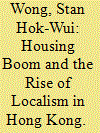

|
|
|
|
|
| Summary/Abstract |
Localist parties have become an emerging force in Hong Kong’s political landscape. What has caused the rise of localism in the city? Extant studies focus on cultural and social factors. In this article, we propose a political economy explanation: global and regional economic factors have caused a housing boom in Hong Kong since the mid-2000s and produced impactful redistributive consequences. While homeowners benefit tremendously from the hike in asset prices, non-homeowners stand to lose. Their divergent economic interests then translate into political preferences; homeowners support political parties that favour the status quo, while non-homeowners tend to support those that challenge it. Using a newly available public opinion survey, we find preliminary evidence in support of our argument. In particular, homeowners are less likely to identify with localist parties and tend to vote for pro-establishment ones. High-income earners, however, are more likely to vote for localist parties.
|
|
|
|
|
|
|
|
|
|
|
|
|
|
|
|
| 9 |
ID:
160424
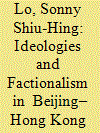

|
|
|
|
|
| Summary/Abstract |
Clashes between the ideologies of pro-Beijing nationalism and pro–Hong Kong localism have become far more prominent in the Hong Kong Special Administrative Region since 2013. This article explores the origins, content, and impact of the ideological conflicts between Beijing and Hong Kong.
|
|
|
|
|
|
|
|
|
|
|
|
|
|
|
|
| 10 |
ID:
101441


|
|
|
|
|
| Publication |
2010.
|
| Summary/Abstract |
Recent waves of new immigration distinct from postcolonial-era migrations can be identified in many Western countries. More than 40 such "new immigrant" candidates contested the 2009 local government elections in the Republic of Ireland. This article draws on interviews with just under half of these and on official responses from each of the Republic's five political parties to a study of "new immigrant" participation in Irish politics. It also draws on a specific locality case study of the border town of Dundalk where support for Sinn Fin, Ireland's most distinctly ethno-nationalist political party, is relatively high. Our analysis of "new immigrant" candidate participation in Irish politics suggests that a number of factors influence responsiveness to these; this article focuses on the salience of theories of racialization, ethnic nepotism, and localism. In particular, the findings emphasize how local identities as manifested by immigrant candidates potentially mediate racial and ethnic barriers.
|
|
|
|
|
|
|
|
|
|
|
|
|
|
|
|
| 11 |
ID:
121447


|
|
|
|
|
| Publication |
2013.
|
| Summary/Abstract |
This essay looks at the 2012 Republican primaries through the lens of "localism" and how candidates and lobbies manipulate for their own purposes the ignorance of their voting constituencies on issues not relevant to their everyday lives. After a discussion of the wider process, the piece focuses on the eight leading candidates in the presidential primary race with regard to Israel and Palestine, with an overview of their positions and advisers. It ends with some reflections on the consequences of the peculiarly American mix of localism, national politics, and special interest groups.
|
|
|
|
|
|
|
|
|
|
|
|
|
|
|
|
| 12 |
ID:
149244
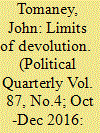

|
|
|
|
|
| Summary/Abstract |
This article challenges the narrowly founded but untroubled consensus about the alleged benefits of the Conservative government's devolution programme. It suggests that too much attention has been paid to purported benefits and too little regard to the potential risks, and draws attention to international evidence that suggests that the distribution of the benefits of devolution is crucially dependent on its design. It critically examines the case for the currently offered model of devolution and finds the underpinning economic model and limited forms of democratic accountability are likely to produce regressive social outcomes and the reinforcement of existing local elites. It calls for a wider public debate and fuller democratic scrutiny of the model of devolution on offer.
|
|
|
|
|
|
|
|
|
|
|
|
|
|
|
|
| 13 |
ID:
123521


|
|
|
|
|
| Publication |
2013.
|
| Summary/Abstract |
This article unpacks the renaissance of interest in 'the local' in peace building. It pays increased attention to local dimensions of peace in a wider context of increased assertiveness by local actors as well as a loss of confidence by major actors behind international peace-support actors. The article sees the 'local turn' in peace building as part of a wider critical turn in the study of peace and conflict, and focuses on the epistemological consequences of the recourse to localism in the conceptualisation and execution of peace building. The local turn has implications for the nature and location of power in peace building. This article is largely conceptual and theoretical in nature but it is worth noting that the local turn is based on reactions to real-world events.
|
|
|
|
|
|
|
|
|
|
|
|
|
|
|
|
| 14 |
ID:
186853
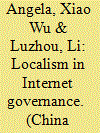

|
|
|
|
|
| Summary/Abstract |
Often analysing ‘the Chinese Internet’ as a national entity, existing research has overlooked China's provincially oriented web portals, which have supplied information and entertainment to substantial user populations. Through the lenses of the critical political economy of media and critical media industry studies, this article traces the ascendance of China's provincial web from the late 1990s to the early 2000s by analysing industry yearbooks, official reports, conference records, personal memoirs, archived webpages, and user traffic data. We uncover interactions between Internet service providers, legacy media organizations, commercial Internet companies, and the central and local governments – each driven by discrete economic interests, political concerns, and imaginaries about the new technology. Delineating the emergence and consolidation of China's provincial web, our study foregrounds the understudied political economy of online content regionalization at scale. Further, it sheds new light on Chinese media policy, Internet governance, and Internet histories, especially the widely noted conservative turn of online cultures after the mid-2010s.
|
|
|
|
|
|
|
|
|
|
|
|
|
|
|
|
| 15 |
ID:
190187


|
|
|
|
|
| Summary/Abstract |
Between the Umbrella Movement in 2014 and the unprecedented mass protests in 2019, Hong Kong experienced a period of movement abeyance during which localism became a prominent political identification, notably among young people. Localism, defined as a reactive form of radicalism, was one pathway after a cycle of contention, alongside persistence with moderate claims and exhaustion, an affective process of detachment from contentious politics after mobilisation. However, the existing literature seldom explores individual attributes to these pathways during movement abeyance. Using survey data gathered from five local universities (N = 1,365), this study seeks to examine how cognitive appraisal of previous protest events, political emotions, and media use during abeyance predict radical and moderate political identifications among university students in Hong Kong. Youths with stronger devotion to the Umbrella Movement and negative emotions after it were more likely to identify as localists. However, youths with these attributes who perceived negative consequences of the Umbrella Movement showed a lower likelihood of being localists or pan-democrats. These results can elucidate the trajectories for radicalisation and exhaustion during post-Umbrella Movement abeyance.
|
|
|
|
|
|
|
|
|
|
|
|
|
|
|
|
| 16 |
ID:
111652


|
|
|
| 17 |
ID:
148024
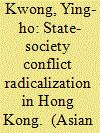

|
|
|
|
|
| Summary/Abstract |
Hong Kong has been facing an increasingly strong “anti-China” sentiment in recent years. More people are worried that existing Mainland-Hong Kong integration actually provides more opportunity for Beijing to exercise political control over Hong Kong, resulting in the loss of local identity. Political parties of the pan-democratic camp, which has been at the forefront of political activism since the 1980s, used to adopt a “milder” approach to oppose intervention from Beijing. However, with more Hong Kong people, especially localists, becoming sceptical towards this tactic, they have resorted to escalating things into “radical” protests or even bloody clashes with the authorities. During Chinese Lunar New Year 2016, a few hundred protesters joined the “Mong Kok Riot” and violently pelted police officers with bricks and glass, leading to more than 120 people being injured. The clashes may on the surface have been about hawker management issues, but, in fact, were fuelled by a growing discontent against the Chinese and Hong Kong Special Administrative Region governments. With more protesters prepared to take more radical actions against the authorities, state-society relations in Hong Kong are likely to enter an unprecedented period of tension.
|
|
|
|
|
|
|
|
|
|
|
|
|
|
|
|
| 18 |
ID:
139227


|
|
|
|
|
| Summary/Abstract |
This introduction presents how views on ‘the local turn’ in peacebuilding has evolved into a significant discourse. Currently, it has ‘its moment’ and is widely used by theorists and practitioners alike, by normative localists as well as by liberal policy-makers, albeit for different reasons and with differing intensions. We suggest that international interventions for the purpose of peacebuilding cannot be justified a priori, but requires resonance at the ‘receiving end’, which the local dimension potentially offers. It is however an elusive and contested concept that requires thorough scrutiny and critical assessment. Here a collection of conceptual and empirical articles is contextualised and introduced, painting a broad state-of-the-art of the pros and cons of the local turn.
|
|
|
|
|
|
|
|
|
|
|
|
|
|
|
|
|
|
|
|
|